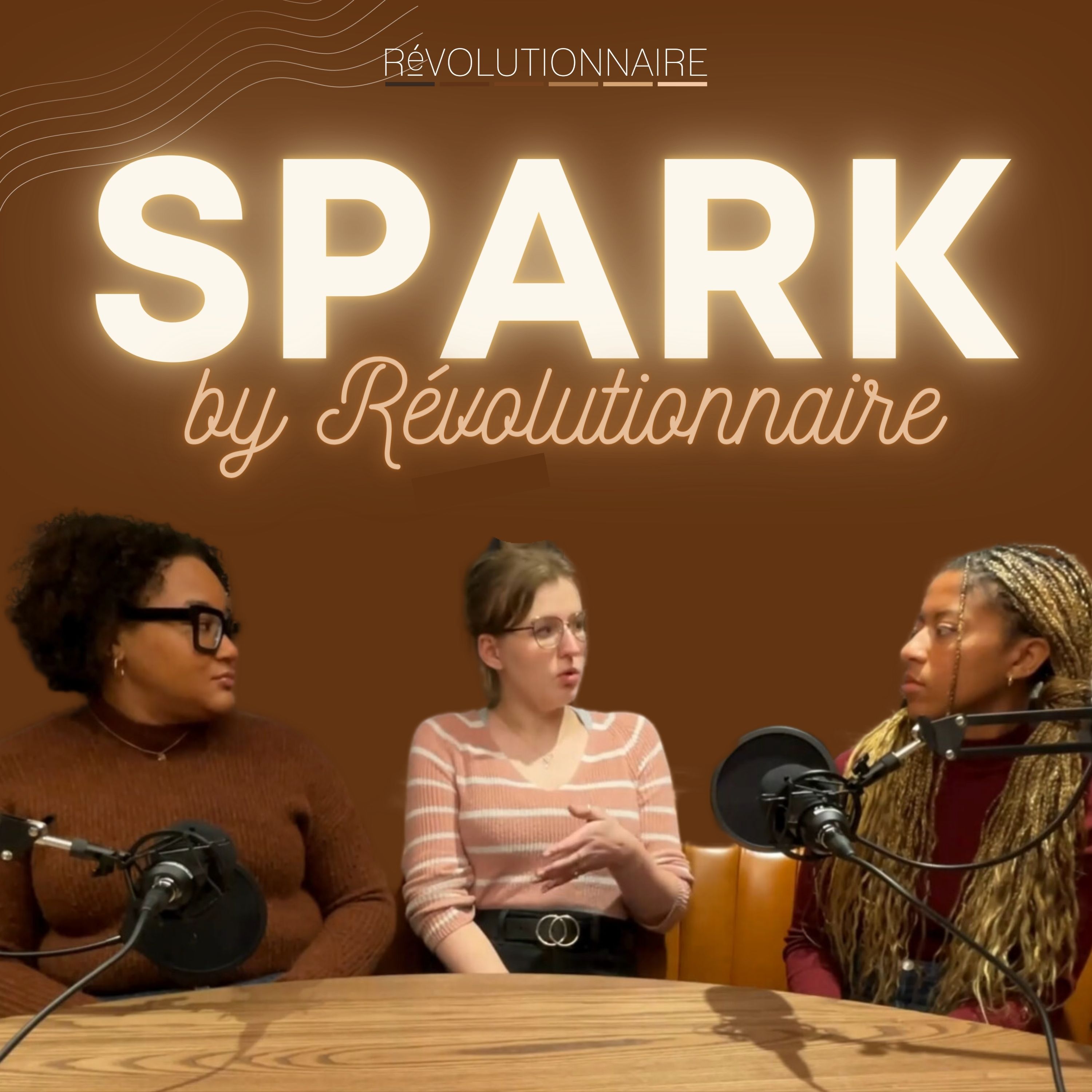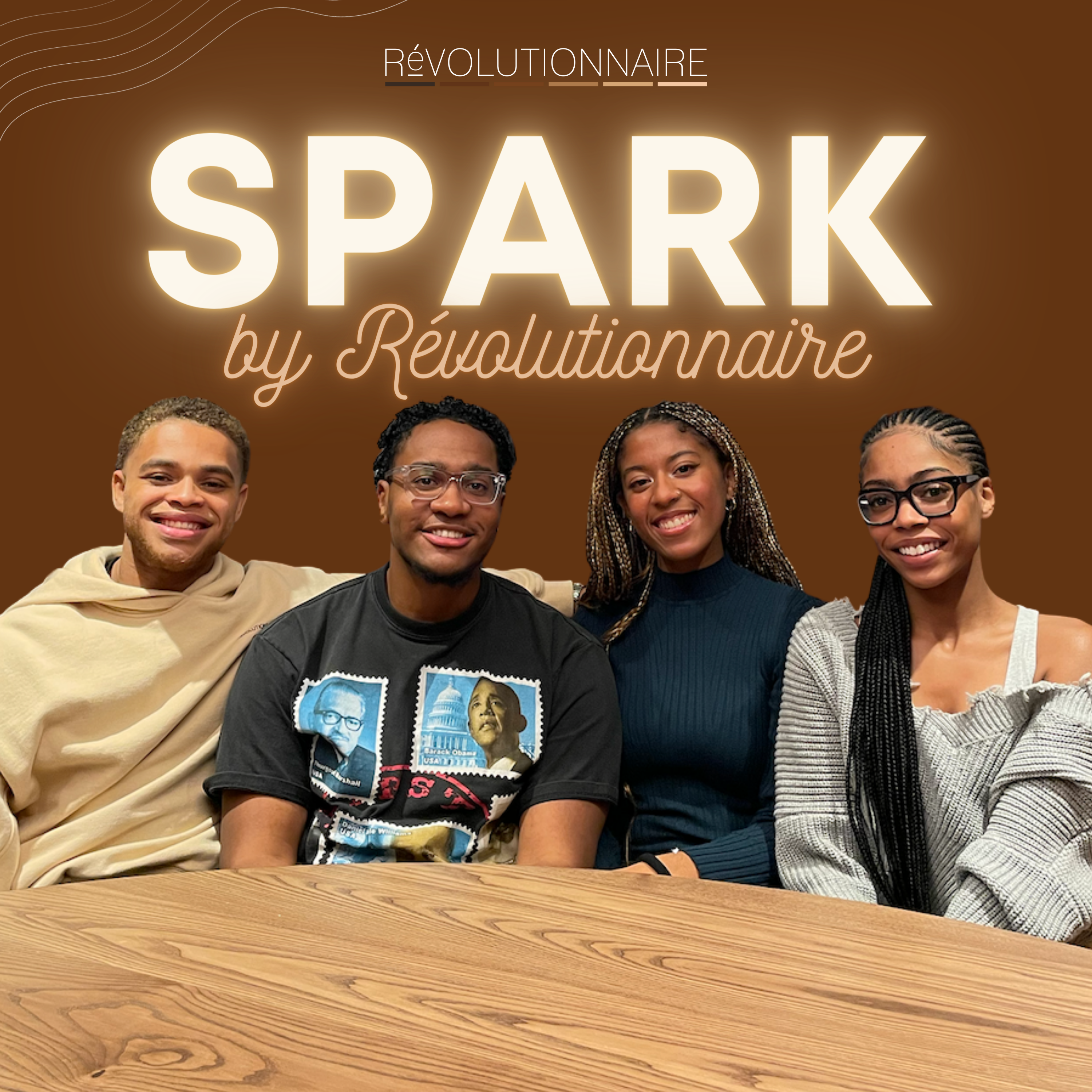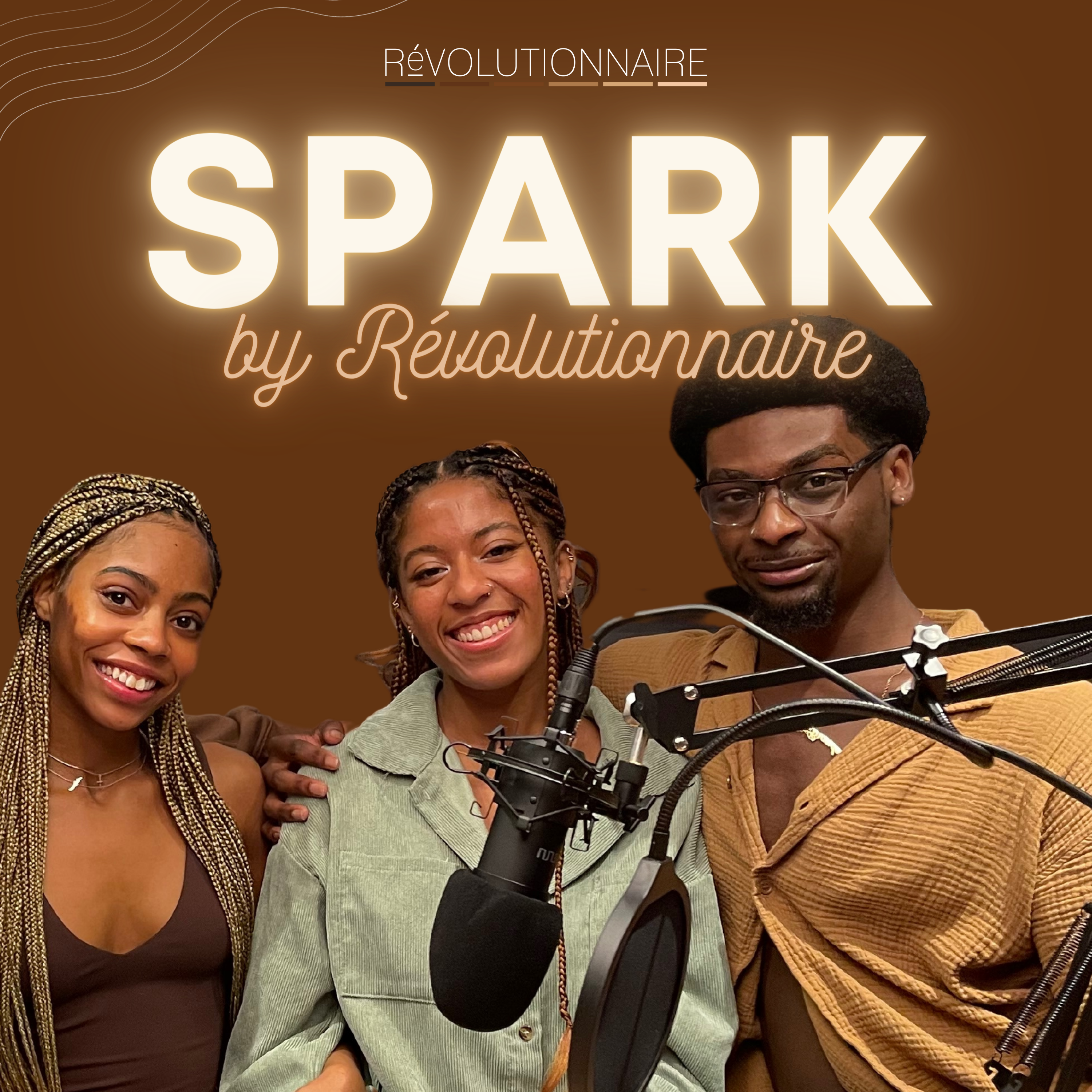Episode Transcript
[00:00:02] Speaker A: Welcome to a special be revolutionary episode of Spark by Revolutionnaire. I'm Justice.
[00:00:07] Speaker B: And I'm Nia. And we're the co founders of revolutionary and co hosts of Be revolutionary. And today we'll be speaking about access to music education with Shawnee Kish and musickills.
[00:00:17] Speaker A: We're here with Shawnee Kish, and super excited for this conversation, Shawnee, so thank you so much for joining us today.
[00:00:23] Speaker C: Absolutely.
[00:00:23] Speaker B: So great to see you again. How are you doing?
[00:00:25] Speaker C: Very good. I'm so excited to be doing this whole inspiring project with you guys.
[00:00:29] Speaker A: We know that you discovered music and instruments at an early age. At what point did you realize that music was what you wanted to do?
[00:00:36] Speaker C: I think it was. At the time, I was always drawn to music and writing, but it really was when I was struggling, you know, as a young person in my young teens, I was struggling with life. I was struggling with knowing my peace and place in the world. You know, I didn't quite understand that, you know, I was meant to be here, and so that was the identity that I struggled with. And having music to be able to, you know, express through and have it as my backup and have it as my therapy and my voice and just use that became my purpose and my reason.
[00:01:16] Speaker B: So that is so beautiful, and let's dive deeper into that because you mentioned your voice, and your voice is so soulful, beautiful, meaningful, and powerful. What was it like growing up and finding your voice and then also finding the confidence to share it with the world?
[00:01:32] Speaker C: It was a journey. You know, I started off as a Shania Twain impersonator. I was 14, so I didn't really much look like her. It was more like a sound thing, but it started there, and I found the love of using the. The power of the voice, the power that music had to, you know, communicate emotion, you know, whether it be strength or happiness or struggle. And I just.
I was so drawn to it that it completely and entirely owned me. Like, it was just like, this path that I knew I had to chase.
Yeah.
[00:02:13] Speaker B: And you spoke about being a Shania twain impersonator, which I think is super cool. What were other dreams that you had for yourself when you were younger, and how have those dreams evolved?
[00:02:22] Speaker C: Honestly, it's always been music. It has always been music. That's not true. I said I wanted to be an actress when I was, but I found out that I'm not. It's not a thing. So I stuck to music, and thankfully, I'm not so bad at it, so.
[00:02:36] Speaker A: You know, not bad at all.
[00:02:38] Speaker B: Absolutely incredible.
[00:02:39] Speaker A: And speaking of dreams coming true and not being bad at music, can you tell us about the moment you found out that you were nominated for contemporary indigenous artists of the year? At last year's Junos, I smashed my.
[00:02:53] Speaker C: Head off the ceiling like the chandelier. Cause I jumped on the couch. Oh, yes. You guys, it was a very intense moment because I think about my younger self and I think about those dreams that I had, but not, I mean, accolades and awards, and that's great.
To me. It helps boost you, it helps boost your voice. But to me, it's like, I now have this platform. The bigger the platform I have, the more I get to share with people like Savannah and people who we like to reach just to say, listen and come to this platform and share what you have to say, because people wanna hear it. And it just gives me that much more.
There's a power in a platform, so I do not take that for granted at all.
[00:03:39] Speaker B: And I love how you spoke about how you use your platform, because for us, we see your music as being such a powerful vehicle for the messages that you share. How do you define the power of music?
[00:03:52] Speaker C: Well, the power of music is, for me, even at times without any restriction of lyric, it's this language that reaches on a stage or through a radio, you know, it reaches exactly who it's meant to reach. So the power that it holds from the person that's expressing that is, it just, it creates. It puts something in the world that sometimes as an artist, you don't even know and fully understand until it just becomes something to someone else. And it's, you know, just knowing that power. When you're sharing, creating music or sharing your music or your voice, your platform.
[00:04:32] Speaker A: Has grown so rapidly, and despite this increased success and reach, you still manage to maintain this high degree of authenticity in everything that you do in this journey of navigating who you are. How have your intersecting identities illuminated your path?
[00:04:47] Speaker C: I think the biggest turning point for my peace of mind and my own being is recognizing and realizing that I don't actually have to be anything at any given time. I could just be my messy self and whatever that comes with. You know, I used to struggle a lot, especially going into the industry. You know, when you walk into a room and you feel uncomfortable because maybe you're not this and maybe you're not that, and the insecurities creep in and your own experiences creep in, and it's just about realizing I have nothing to prove other than my own journey to myself. I answered to my own journey and I'm, you know, I'm two spirit, and I'm, you know, discovering my culture as an indigenous person and, you know, and discovering what I've overcome in my life and how that represents me when I am in a room. And it's just. It doesn't have to look pretty, it doesn't have to be perfect, and it doesn't have to be anything. It's. It's. It's. It's about the journey for me, and it's. And I found so much comfort. There was a time having this conversation with you.
You know, I really would have struggled with answering these questions because I didn't.
I couldn't feel my identity. I couldn't feel my spirit. Whereas now it doesn't need to make sense. It really doesn't. It just needs to be authentic, and it needs to be real for, you know, and that's hard. That's hard to do. It's easier said than done.
[00:06:17] Speaker B: And as you found that authenticity and as you've built your platform, you've also been steering the way and trailblazing for other young people to come. Why was it important for you to use your platform to support music camps?
[00:06:31] Speaker C: I know what it's like to be that young person where you feel like you don't have a place and you feel like.
You feel like you don't matter, you know, and to be able to use music, use your story, you know, even something like songwriting, you know, if you have no interest in.
If it's just about the songwriting, it's just about the poetry you're expressing. If it's about the voice you're expressing and, you know, having those outlets and having the tools or even the introduction to that world, and to say, you know, it's hard to be young. It really is. You know, in all of our own individual ways, we've all, like, felt that. And so, you know, I think it's just so important to say, use the outlet that's there for you. If you feel alone and if you feel like you can't, you can. And you can use the outlet because that nobody can take from you ever. Nobody's going to be able to take that from you. You can be in a dark room all alone with your pen and paper or with your voice, and that's going to be your champion.
[00:07:39] Speaker D: Wow.
[00:07:39] Speaker B: Rue, and I love what you said. If you feel like you can't remember that, you can. That's so powerful.
[00:07:45] Speaker C: Definitely 100%.
[00:07:47] Speaker A: Shaunie, in your eyes, what would it look like if every single child in this country had access to music education.
[00:07:55] Speaker C: We would feel inspired by, and we would listen and pay attention to a generation that has something to say. Like, these kids have something to say, you know, especially our young indigenous youth. Like, they are such inspirational, powerful little beings. We're just not listening, so. And like I said, music and art being this unspoken language that when you hear, it's. I find, you know, when it's Savannah, you know, you can. It's hard to understand her story. Cause she's so shy and she feels nervous and that all. You know.
But when she sings, yes, you get it. Cause you're like, I see you. Yes, I see you. I'm sorry, I didn't see you, but I see you.
[00:08:35] Speaker B: Absolutely. And Shawnee, you are truly revolutionary and an inspiration to so many people around the world. What is your advice to other people who want to be revolutionary?
[00:08:45] Speaker C: Well, I gotta tell you guys, I'm entirely inspired, and I have been since I've met you guys. You're so incredible in every way. You just like beam and I'm not even.
I think it's wonderful what you guys are doing. And I agree with you. It's about a dream. It's about having a dream gives you meaning and purpose. And sometimes when you don't know what that meaning and purpose is, when you don't have anybody to back you up and propel you towards, you don't need. You don't need anybody to believe in you to have a dream and to create something everlasting in this world. With that dream, I think you can be unstoppable.
[00:09:26] Speaker B: Shawnee, thank you so much. We are just over the moon inspired and honored to speak with you today and grateful for all the incredible work that you're leading. So thank you, thank you.
[00:09:37] Speaker C: And thank you for what you do.
[00:09:38] Speaker A: Also, thank you, Shani. To learn more about Shawnee and support the incredible work of music camps, head to wWW Dot Joinrev, Co we're here with Christy, the president of musiccounts, and so looking forward to hearing more about the wonderful work of this impactful organization.
[00:09:54] Speaker B: Christy, it is so great to meet you.
[00:09:56] Speaker D: It is so wonderful to meet you guys and thank you very much for having us here.
[00:10:00] Speaker B: Christy, you have been doing some phenomenal work, and we would love to know how you defined the power of music and what that looks like in your.
[00:10:08] Speaker D: Daily work at musiccounts. We believe that all kids should have access to the incredible benefits of music and music education.
Over the years, I've had an opportunity to work with a number of artists, and I can't tell you how many of them have said to me that music has literally saved their lives at a certain stage of their life.
So at musiccounts, we understand the importance and value of the work of making music education accessible and available to all youth across Canada. And the best part is, anybody can create music. You don't have to be an extraordinary percussionist or have a pitch perfect voice. Anybody can benefit from the creation of music.
[00:10:54] Speaker A: And we know that music counts as pillars are invest, educate, empower and celebrate. Tell us about those and what they mean.
[00:11:01] Speaker D: Well, first of all, I'm really impressed that you have remembered our four pillars, and the four pillars for music counts are really pivotal in helping guide us as we try to make sure that there is the critical funding required for music education. So first off, we invest. Music counts invests in community music programs and school music programs across the country. In fact, we've put over $16 million into music programs in our 25 year history, and we're really just scratching the surface.
We also educate, and we educate through our music counts learn programs. And those are resources that we provide to both teachers and students and making sure that they have the most innovative tools available to them to help make sure music education is flourishing in the classroom. And we also honor. We honor incredible recipients like the music counts teacher of the year and our many incredible ambassadors that we have in the music industry.
And we celebrate ultimately, I mean, what is more important in celebration than music? So we celebrate the incredible work of many artists and as well our scholarship recipients.
[00:12:18] Speaker B: And we just had a phenomenal conversation with Shawnee Kish and are so inspired by how she is championing youth access to music education. What excites you most about working with Shani?
[00:12:30] Speaker D: We are incredibly honored to be working with someone like Shawnee. She is such an inspiration.
At music council. We do a lot of work in remote and indigenous communities, and often within these communities, there's been intergenerational trauma for these kids and systemic barriers that are really hard for a lot of people to relate to. So for us to be able to work with such a strong and powerful and Juno award winning, incredible indigenous woman, I can't think of a better role model for us to be able to showcase the transformational benefits of music and music education.
[00:13:10] Speaker A: I'd love to dig into the transformative power of music, because oftentimes at revolutionary, we talk about the importance of a young person finding their voice and being able to share that with the community and the world. What does that look like in the music world.
[00:13:23] Speaker D: Yeah. It's so important for kids to find their voice, and not only to find their voice, but to use their voice. And I would say right now we are in unprecedented times and that there is more depression, anxiety, and overall stress for young people. Yet we know that music and music education is one of the best ways to combat these challenges. So we want to make sure that we are continuing to do the work, to make sure kids have access to our programs, to make sure that these programs are helping them overcome so many of these challenges. And that is transformation. Music is transformation.
[00:14:02] Speaker B: Christy, it has been so great speaking with you today and learning more about the incredible work of music counts. Can you share how others can support?
[00:14:10] Speaker D: I would love to and thank you for having me. So if anyone would like to get involved, the reality is, as I've said before, music is incredibly underfunded within our country, and music education is underfunded. And the only way that we can really help combat that is to ask respectfully if anyone is interested in donating to our cause to log into musiccounts ca there. It is very easy to donate and also to read about our programs and find out that the work we're doing and where that money will go and the transformation it will have on young people.
[00:14:46] Speaker B: Thank you so much, Christy. This has been such a great conversation.
[00:14:50] Speaker D: Thank you so much for having me. It has really been a privilege to be here with you both.
[00:14:54] Speaker B: Hey, y'all make sure that y'all stay tuned for more episodes for Spark by Révolutionnaire.
[00:14:58] Speaker C: Revolutionnaire and follow us on TikTok and Instagram at Revolutionnaire.co


